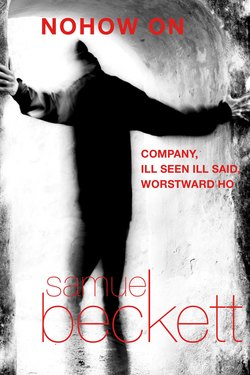Читать книгу Nohow On - Samuel Beckett - Страница 8
На сайте Литреса книга снята с продажи.
ОглавлениеCompany
A voice comes to one in the dark. Imagine.
To one on his back in the dark. This he can tell by the pressure on his hind parts and by how the dark changes when he shuts his eyes and again when he opens them again. Only a small part of what is said can be verified. As for example when he hears, You are on your back in the dark. Then he must acknowledge the truth of what is said. But by far the greater part of what is said cannot be verified. As for example when he hears, You first saw the light on such and such a day. Sometimes the two are combined as for example, You first saw the light on such and such a day and now you are on your back in the dark. A device perhaps from the incontrovertibility of the one to win credence for the other. That then is the proposition. To one on his back in the dark a voice tells of a past. With occasional allusion to a present and more rarely to a future as for example, You will end as you now are. And in another dark or in the same another devising it all for company. Quick leave him.
Use of the second person marks the voice. That of the third that cankerous other. Could he speak to and of whom the voice speaks there would be a first. But he cannot. He shall not. You cannot. You shall not.
Apart from the voice and the faint sound of his breath there is no sound. None at least that he can hear. This he can tell by the faint sound of his breath.
Though now even less than ever given to wonder he cannot but sometimes wonder if it is indeed to and of him the voice is speaking. May not there be another with him in the dark to and of whom the voice is speaking? Is he not perhaps overhearing a communication not intended for him? If he is alone on his back in the dark why does the voice not say so? Why does it never say for example, You saw the light on such and such a day and now you are alone on your back in the dark? Why? Perhaps for no other reason than to kindle in his mind this faint uncertainty and embarrassment.
Your mind never active at any time is now even less than ever so. This is the type of assertion he does not question. You saw the light on such and such a day and your mind never active at any time is now even less than ever so. Yet a certain activity of mind however slight is a necessary adjunct of company. That is why the voice does not say, You are on your back in the dark and have no mental activity of any kind. The voice alone is company but not enough. Its effect on the hearer is a necessary complement. Were it only to kindle in his mind the state of faint uncertainty and embarrassment mentioned above. But company apart this effect is clearly necessary. For were he merely to hear the voice and it to have no more effect on him than speech in Bantu or in Erse then might it not as well cease? Unless its object be by mere sound to plague one in need of silence. Or of course unless as above surmised directed at another.
A small boy you come out of Connolly’s Stores holding your mother by the hand. You turn right and advance in silence southward along the highway. After some hundred paces you head inland and broach the long steep homeward. You make ground in silence hand in hand through the warm still summer air. It is late afternoon and after some hundred paces the sun appears above the crest of the rise. Looking up at the blue sky and then at your mother’s face you break the silence asking her if it is not in reality much more distant than it appears. The sky that is. The blue sky. Receiving no answer you mentally reframe your question and some hundred paces later look up at her face again and ask her if it does not appear much less distant than in reality it is. For some reason you could never fathom this question must have angered her exceedingly. For she shook off your little hand and made you a cutting retort you have never forgotten.
